2009 河南考研英语二真题及答案
Section II Close(10%) Directions: For each numbered blank in the following
passage ,there are four choices marked A, B, C, and D. Choose thebest one and mark
your answer on ANSWER SHEET 1 with a pencil. (10 points)
(26)
(28)
poor
nations
with
economic
and political map of the world,
(25)
some in the west see as a new threat.
delta region. Triple-digit oil prices have
from higher
prices. Consider Germany.
(35) it
(29)
unpleasant, to do it .
In1999, the price of oil hovered around $16 a barrel. By 2008, it had(21)the $100
a barrel mark. The reasons for the surge (22) from the dramatic growth of the
economies of china and India to widespread
(23) in oil-producing regions,
including Iraq and Nigeria's
(24)
some old notions of power.
the
Oil-rich nations are enjoying historic gains and opportunities,
major
importers—including chinaand
India, home to a third of the world's population--
(27) rising economic and social costs.Managing this new order is fast becoming a
central
of global politics. Countries that need oil are clawing at each
government,
other
scarce supplies, and are willing to deal with any
to
many
(30) how
In
oil , the
profits are being ,lost to corruption,(31)
these countries of their best hope for
development. And oil is fueling enormous investment funds run by foreign governments,
Countries like Russia, Venezuela
(32)
33, a change reflected in newly
and Iran are well supplied with rising
aggressive foreign policies. But some unexpected countries are reaping benefits,
(34) costs,
imports virtually
all its oil, it has prospered from extensive trade with a booming Russia and the
Middle East. German exports to Russia
128 percent from 2001 to 2006.
In the United States, as already high gas prices rose
higher in the spring
of 2008,the issue cropped up in the presidential campaign, with Senators McCain and
Obama
for a federal gas tax holiday during the peak summer driving months.
And driving habits
,as sales of small cars jumped and mass
transport systems
21. A. come
22. A. covered
23. A. intensity
24. A. drawn
25. A. fighting
26. A. and
27. A. confine
28. A. problem
29. A. look for
30. A. no matter
31. A. abolishing
32. A. what
D. threatenin
D. though
D. confront
D. event
D. keep off
D. in spite of
D. eliminating
B. struggling
B. while
B. conflict
B. question
B. lock up
B. what if
B. depriving
C. thus
C. conform
C. matter
C. send out
C. only if
C. destroying
D. arrived
D. ranged
D.instability
(40) the country reported a sharp increase in riders.
B. discovered
B. infinity
B. redrawn
C. retained
D. reviewed
C. crossed
C. arranged
B. that
C. which
D. whom
oil
(36)
C. insecurity
C. challenging
(37)
(38)
began
to
(39)
B. gone
�
33. A. interests
34. A. as many as
35. A. Although
36. A. advanced
37. A. even
38. A. asking
39. A. change
40.A. for
B. taxes
B. as good as
C. incomes
C. as far as
D. revenues
D. as well as
B. Because
B. grew
B. still
B. requesting
B. turn
B. from
reduces
C. Since
C.
C. rather
C. calling
C. shift
C. across
multiplie
D. As
D.
D. fairly
D. demanding
D. transform
D. Over
Part III Reading Comprehension (40%) Direction: There are 4 passages in this part.
Each passage is followed by some questions or unfinished statements. For each of
them there are four choices marked A, B, C, and D. You should decide on the best
choice. Then blacken the corresponding letter on the Answer Sheet with a pencil.
PASSAGE1. Henric Ibsen ,author of the play"A Doll's House", in which a pretty,
helpless housewife abandons .Her husband and children to seek a more serious life,
would surely have approved.. From January Ist ,2008, all public companies in Norway
are obliged to ensure that at least 40% of their board directors are women. Most
firms have obeyed the law, which was passed in 2003.But about 75 out of the 480 or
so companies it affects are still too male for the government's liking. They will
shortly receive a letter informing them that they have until the end of February
to act , or face the legal consequences---which could include being dissolved. Before
the law was proposed, about 7% of board members in Norway were female , according
to the Centre for Corporate Diversity .The number has since jumped to 36%. That is
far higher than the average of 9% for big companies across Europe or America's 15%
for the Fortune 500.Norway's stock exchange and its main business lobby oppose the
law, as do many businessmen." I am against quotas for women or men as a matter of
principle," says Sverre Munck , head of international operations at a media firm.
"Board members of public companies should be chosen solely on the basis of merit
and experience,"be says. Several firms have even given up their public status in
order to escape the new law. Companies have had to recruit about 1,000 women in four
years. Many complain that it has been difficult to find experienced candidates.
Because of this, some of the best women have collected as many as 25-35 directorships
each, and are known in Norwegian business circles as the "golden skirts". One reason
for the scarcity is that there are fairly few women in management in Norwegian
companies---they occupy around 15% of senior positions. It has been particularly
hard for firms in the oil, technology and financial industries to find women with
a enough experience. Some people worry that their relative lack of experience may
keep women quiet on boards, and that in turn could mean that boards might become
less able to hold managers to account. Recent history in Norway, however, suggests
that the right women can make strong directors. "Women feel more compelled than men
to do their homework," says Ms Reksten Skaugen , who was voted Norway's chairman
of the year for 2007, "and we can afford to ask the hard questions, because women
are not always expected to know the answers."
�
B. explain the newly passed law
41. The author mentions Ibsen's play in the first paragraph in order to?????????? .
A. depict women's dilemma at work
C. support
D. introduce the topic under discussion 42. A public company
Norwegian government
that fails to obey the new law could be forced to?????????? . A. pay a heavy fine
B. close down its business C. change to a private business D. sign a document
promising to act 43. To which of the following is Sverre Munck most likely to agree?
A. A set ratio of women in a board is unreasonable. B. A reasonable quota for women
at work needs to be set. C. A common principle should be followed by all companies.
D. An inexperienced businessman is not subject to the new law.
44.The author attributes the phenomenon of "golden skirts" to??????????? . A. the
small number of qualified females in management B. the over-recruitment of female
managers in public companies
C. the advantage women enjoy when competing for senior
positions D. the discrimination toward women in Norwegian business circles 45. The
main idea of the passage might be???????? . A. female power and liberation in Norway
B. the significance of Henric Ibsen's play C. women's status in Norwegian firms D.
the constitution of board members in Norway
PASSAGE2 While there's never a good age to get cancer, people in their 20s and 30s
can feel particularly isolated. The average age of a cancer patient at diagnosis
is 67. Children with cancer often are treated at pediatric (小儿科的) cancer centers,
but young adults have a tough time finding peers, often sitting side-by-side during
treatments with people who could be their grandparents. In her new book Crazy Sexy
Cancer Tips, writer Kris Carr looks at cancer from the perspective of a young adult
who confronts death just as she's discovering life. Ms. Carr was 31 when she was
diagnosed with a rare from of cancer that had generated tumors on her liver and lungs.
Ms. Carr reacted with the normal feelings of shock and sadness. She called her parents
and stocked up on organic food, determined to become a "full-time healing addict."
Then she picked up the phone and called everyone in her address book, asking if they
knew other young women with cancer. The result was her own personal "cancer posse":
a rock concert tour manager, a model, a fashion magazine editor, a cartoonist and
a MTV celebrity, to name a few. This club of? "cancer babes" offered support, advice
and fashion tips, among other things. Ms. Carr put her cancer experience in a recent
Learning Channel documentary, and she has written a practical guide about how she
coped. Cancer isn't funny, but Ms. Carr often is. She swears, she makes up names
for the people who treat her ( Dr. Fabulous and Dr. Guru ), and she even makes second
sound fun ("cancer road trips," she calls them). She leaves the medical advice to
doctors, instead offering insightful and practical tips that reflect the world view
of a young adult. "I refused to let cancer ruin my party," she writes. " There are
just too many cool things to do and plan and live for." Ms. Carr still has cancer,
but it has stopped progressing. Her cancer tips include using time-saving mass
e-mails to keep friends informed, sewing or buying fashionable hospital gowns so
you're not stuck with regulation blue or gray and playing Gloria Gaynor's "I Will
Survive" so loud you neighbors call the police. Ms. Carr also advises an eyebrow
�
wax and a new outfit before you tell the important people in your illness. " people
you tell are going to cautious and not so cautiously try to see the cancer, so dazzle
them instead with your miracle," she writes. While her advice may sound superficial,
it gets to the heart of what every cancer patient wants: the chance to live life
just as she always did, and maybe better.
46. Which of the following groups is more vulnerable to cancer? A. Children. B. People
in their 20s and 30s. C. Young adults. D. Elderly people. 47. All of the following
statements are true EXCEPT _______.
A. Kris Carr is a female writer B. Kris Carr is more than 31-year-old. C. Kris Carr
works in a cancer center. D. Kris Carr is very optimistic. 48. The phrase "cancer
posse" (Line 4, para.3 ) probably refers to ________ A. a cancer research
organization B. a group of people who suffer from cancer C. people who have recovered
from cancer D. people who cope with cancer 49. Kris Carr make up names for the people
who treat her because ________ A. she is depressed and likes swearing B. she is funny
and likes playing jokes on doctor C. she wants to leave the medical advice to doctor
D. she tries to leave a good impression on doctor 50. From Kris Carr's cancer tips
we may infer that ________ A. she learned to use e-mails after she got cancer B.
she wears fashionable dress even after suffering from cancer C. hospital gowns for
cancer patients are usually not in bright colors D. the neighbors are very friendly
with cancer patients
PASSAGE3 Questions 51 to 55 are based on the following passage: Should a leader strive
to be loved or feared?This question,famously posed by Machiavelli,lies at the heart
of Joseph Nye's new book.Mr.Nye,a former dean of the Kennedy School of Govemment
at Harvard and one-time chairman of America's National Intelligence Council,is best
known for promoting the idea of "soft power",based on persuasion and influence,as
a counterpoint to "hard power",based on coercion(强迫) and force. Having analyzed
the use of soft and hard power in politics and diplomacy in his previous books,Mr.Nye
has now turned his attention to the relationship between power and leadership,in
both the political and business spheres.Machiavelli,he notes,concluded that "one
ought to be both feared and loved,but as it is difficult for the two to go together,it
is much safer to be feared than loved."In short,hard power is preferable to soft
power.But modem leadership theorists have come to the opposite conclusion. The
context of leadership is changing,the observe,and the historical emphasis on hard
power is becoming outdated.In modem companies and democracies,power is increasingly
diffused and traditional hierarchies(等级制) are being undermined,making soft power
ever more important.But that does not mean coercion should now take a back seat to
persuasion.Mr.Nye argues.Instead,he advocates a synthesis of these two views.The
conclusion of The Powers to Lead ,his survey of the theory of leadership,is that
a combination of hard and soft power,which he calls”smart power”,is the best approach.
The dominant theoretical model of leadership at the moment is ,apparently,the
“transformational leadership pattern”.Anone allergic(反感) to management term
will already be running for the exit,but Mr,Nye has performed a valuable service
�
in rounding up and summarizing the various academic studies and theories of
leadcriship into a single,slim volume.He examines different approaches to
leadership,the morality of leadership and how the wider context can determine the
effcctiveness of a particular leader.There are plcnty of anccdotes and examples,both
historical and contemporary,political and corporate. Alsa,leadership is a slippery
subject,and as he depicts various theories,even Mr.Nye never quite nails the jelly
to the wall.He is at his most interesting when discussing the moral aspects of
leadershipin particular,the question of whether it is sometimes necessary for good
leaders? to lie -and he provides a helpful 12-point summary of his
conclusions.A recuming theme is that as circumstances change,different sorts of
leadcrs are required;a leader who thrives in one environment may struggle in
another,and vice versa.Ultimately that is just a fancy way of saying that leadcrship
offers no casy answers.
51.From the first two paragraphs we may learn than Mr.Machiavelli's idea of hard
power is ______. A.well accepted by Joseph Nye B.very influential till nowadays
C.based on sound theories D.contrary to that of modem leadership theorists 52.Which
of the following makes soft power more important today according to Mr.Nye?
A.Coercion is widespread. B.Morality is devalued. C.Power is no longer concentrated.
D.Traditional hierarchies are strengthened 53.In his book the Powers to lead,Mr.Nye
has exmined all the following aspects of leadership EXCEPT_____. A.authority
B.context C.approaches D.morality 54.Mr.Nye's book is particularly valuable in that
it _____. A.makes little use of management terms
B.summarizes various studies
concisely C.serves as an exit for leadership researchers D.sets a model for
contemporary corporate leaders 55.According to the author,the most interesting part
of Mr.Nye's book lies in his _____. A.view of changeable leadership B.definition
of good leadership C.summary of leadership history D.discussion of moral leadership
PASSAGE4 Questions 56to 60are based on the following passage: Americans don't like
to lose wars. Of course, a lot depends on how you define just what a war is. There
are shooting wars-the kind that test patriotism and courage-and those are the kind
at which the U.S excels. But other struggles test those qualities too. What else
was the Great Depression or the space race or the construction of the railroads?
If American indulge in a bit of flag—when the job is done, they earned it. Now there
is a similar challenge. Global warming. The steady deterioration(恶化)of the very
climate of this very planet is becoming a war of the first order, and by any measure,
the U.S. produces nearly a quarter of the world's greenhouse gases each year and
has stubbornly made it clear that it doesn't intend to do a whole lot about it.
Although 174 nations approved the admittedly flawed Kyoto accords to reduce carbon
levels, the U.S. walked away from them. There are vague promises of manufacturing
fuel from herbs or powering cars with hydrogen. But for a country that tightly cites
patriotism as one of its core values, the U.S. is taking a pass on what might be
the most patriotic struggle of all. It's hard to imagine a bigger fight than one
for the survival of a country's coasts and farms, the health of its people and
�
stability of its economy. The rub is, if the vast majority of people increasingly
agree that climate change is a global emergency, there's far less agreement on how
to fix it. Industry offers its pans, which too often would fix little.
Environmentalists
offer theirs, which too often amount to native wish lists that could weaken
American's growth. But let's assume that those interested parties and others will
always bent the table and will always demand that their voices be heard and that
their needs be addressed. What would an aggressive, ambitious, effective plan look
like-one that would leave the U.S. both environmentally safe and economically sound?
Halting climate change will be far harder. One of the more conservative plans for
addressing the problem calls for a reduction of 25 billion tons of carbon emissions
over the next 52 year. And yet by devising a consistent strategy that mixes and blends
pragmatism(实用主义)with ambition, the U.S. can, without major damage to the economy,
help halt the worst effects of climate change and ensure the survival of its way
of life for future generations. Money will do some of the work, but what's needed
most is will. "I'm not saying the challenge isn't almost overwhelming," says Fred
Krupp. "But this is America, and America has risen to these challenges before."
56. What does the passage mainly discuss? A. Human wars. B. Economic crisis. C.
America's environmental policies. D. Global environment in general. 57. From the
last sentence of paragraph 2 we may learn that the survival of a country's coasts
and farms, the health of its people and the stability of its economy is__________.
A. of utmost importance B. a fight no one can win C. beyond people's imagination
D. a less significant issue 58. Judging from the context, the word "rub"(Line 1,
Para.3)probably means_______. A. friction B. contradiction
D.
problem 59. What is the author's attitude toward America's policies on global warming?
A. Critical B. Indifferent C. Supportive D. Compromising 60. The paragraphs
immediately following this passage would most probably deal with___________. A.
the new book written by Fred Krupp B. how America can fight against global warming
C. the harmful effects of global warming
D. how America can tide over economic
crisis
C. conflict
Part V Writing (20%)
Direction: In this section, you are asked to write an essay based on the following
information. Make comments and express your own opinion. You should write at least
150 words on Answer Sheet 2.
At present, there is no doubt that short message plays an increasingly important
role in our lives . We are all aware that, like everything else, short message have
both favorable and unfavorable aspects.
Generally speaking, the advantages can be listed as follows. First of all, in
�
festivals, we can send short messages to wish good luck to other people we know.
It brings us a lot of convenience. In addition, short message connects its users
with the outside world. For example, some people subscribe weather forecast or news
short messages, with them, people’s life will be greatly enriched.
But it is pity that every coin has two sides. The disadvantages of short message
can’t be ignored. We spend too much time on spelling our words and sending short
messages that we can’t focus on our studies. Also, you will always be annoyed by
strangers’ short messages one after another.
As is known to all, short message is neither good nor bad itself. In my opinion,
we can use it. But we shouldn’t spend too much time on it and don’t let it disturb
us from our lives.
参考答案
SECTION 2
21-30 CDDBC BDABA 31-40 BADDA BACAC
SECTION 3
41-50 BBAAC CCBCC 51-60 DCABD CAAAC
SECTION 4 由于国家金融体制处于危机边缘动荡,一些大银行和金融机构中的高级管理人
员的补偿金计划就受到密切 关注. 银行家们过度冒险是金融危机的至关重要原因,在历史
上也有类似情况.在这种情况下,一般是由低息引起并 造成持续的错觉,其实是一种债务泡
沫经济. 抵押贷款人很乐意把大量资金借给无力偿还的人,就把贷款瓜分了,并沿这样的链
条出售给下一个金融机构, 这些做法都在利用高科技证券业,结果,却增加了抵押资产的风
险. 金融条例必须能应付这种能使银行下滑的,最不负责任的做法,以期扭转下一个危机,
而这下一个危机很可能 包括有各种类型的技术和资产.但值得审视补偿金计划的根本问题,
因为那是眼前利益,但却让银行家们不负 责任的甘冒风险.
46.Directions: In this
section there is a text in English .Translate it into Chinese. Write your translation
on ANSWER SHEET2.(15points) “Suatainability” has become apopular word these days,
but to Ted Ning, the concept will always have personal meaning. Having endured
apainful period of unsustainability in his own life made itclear to him that
sustainability-oriented values must be expressed though everyday action and choice.
Ning recalls spending aconfusing year in the late 1990s selling insurance. He’d
been though the dot-com boom and burst and,desperate for ajob,signed on with a
Boulder agency. It didin’t go well. “It was a really had move because that’s not
my passion,” says Ning, whose dilemma about the job translated, predictably, into
a lack of sales. “I was miserable, I had so much anxiety that I would wake up in
the middle of the night and stare at the ceiling. I had no money and needed the job.
Everyone said, ‘Just wait, you’ll trun the corner, give it some time.’” 翻译
参考
“坚持不懈”如今已成一个流行词汇,但对 TedNing 而言,这个概念一直有个人
含义,经历了一段痛苦松 懈的个人生活,使他清楚面向以坚持不懈为导向的价值观,必须
贯彻到每天的行动和选择中。
Ning 回忆起 20 世纪 90 年代末期卖保险的那段迷茫时
光,他通过蓬勃兴起的网络疯狂地找工作,并且 与 Boulder 代理机构签了约。
事情
进展并不顺利,TedNing 说到:“那真是个糟糕的选择,因为我对此没有激情,”可以预料,
�
他把工作中的矛盾能解释为没有业务。Ning 说:“我很痛苦渴望午夜起来盯着天花板,我没
钱,我需要工作,每 个人都说‘等吧,只要有耐心会好转的。’”
47. Directions: You have just come back from the U.S. as a member of a Sino-American
cultural exchange program. Write a letter to your American colleague to 1) Express
your thanks for his/her warm reception; 2) Welcome him/her to visit China in due
course. You should write about 100 words on ANSWER SHEET 2. Do not sign your own
name at the end of the letter. Use “Zhang Wei” instead. Do not write your address.
(10 points) Dear xxx, I would like to convey my heartfelt thanks to you for your
kindness to receive me when I participated in an exchange program in USA.
Your
generous help made it possible that I had a very pleasant stay and a chance to know
American cultures better. Besides, I think it is an honor for me to make friends
with you and I will cherish the goodwill you showed to me wherever I go. I do hope
that you will visit China one day, so that I could have the opportunity to repay
your kindness and refresh our friendship. I feel obliged to thank you again.
Sincerely yours, Zhang Wei 48. Directions: In this section, you are asked to write
an essay based on the following chart. In your writing, you should 1) Interpret the
chart and 2) Give your comments. You should write at least 150 words. Write your
essay on on ANSWER SHEET 2. (15 points)
In this chart, we can see the mobile
phone subscriptions in developed countries have a steady and slight increase from
1990 to 2007 and then remain constant in 2008. Meanwhile the mobile phone
subscriptions in developing countries have witnessed a slow increase from 1990 to
2004 and then a great surge from 2004 to 20007: the biggest surge happens from 2005
to 2006. This chart reflects different developing modes of mobile phone industry
in developed and developing countries. The developed countries have a limited number
of populations, most of whom are well-educated. Therefore, the spreading of the
mobile phone service is efficient and soon the market is saturated. Also at the
beginning the developed countries have more people who can afford this service. The
developing countries have a large population who keeps a large demand for mobile
service. As the mobile phone service becomes cheaper and cheaper, the increasing
customers subscribe to benefit from this service. As discussed above, it is not
surprising to see this change. In my opinion, this trend that the number of
mobile-phone subscriptions is increasingly increasing will continue for a while in
the future.
�
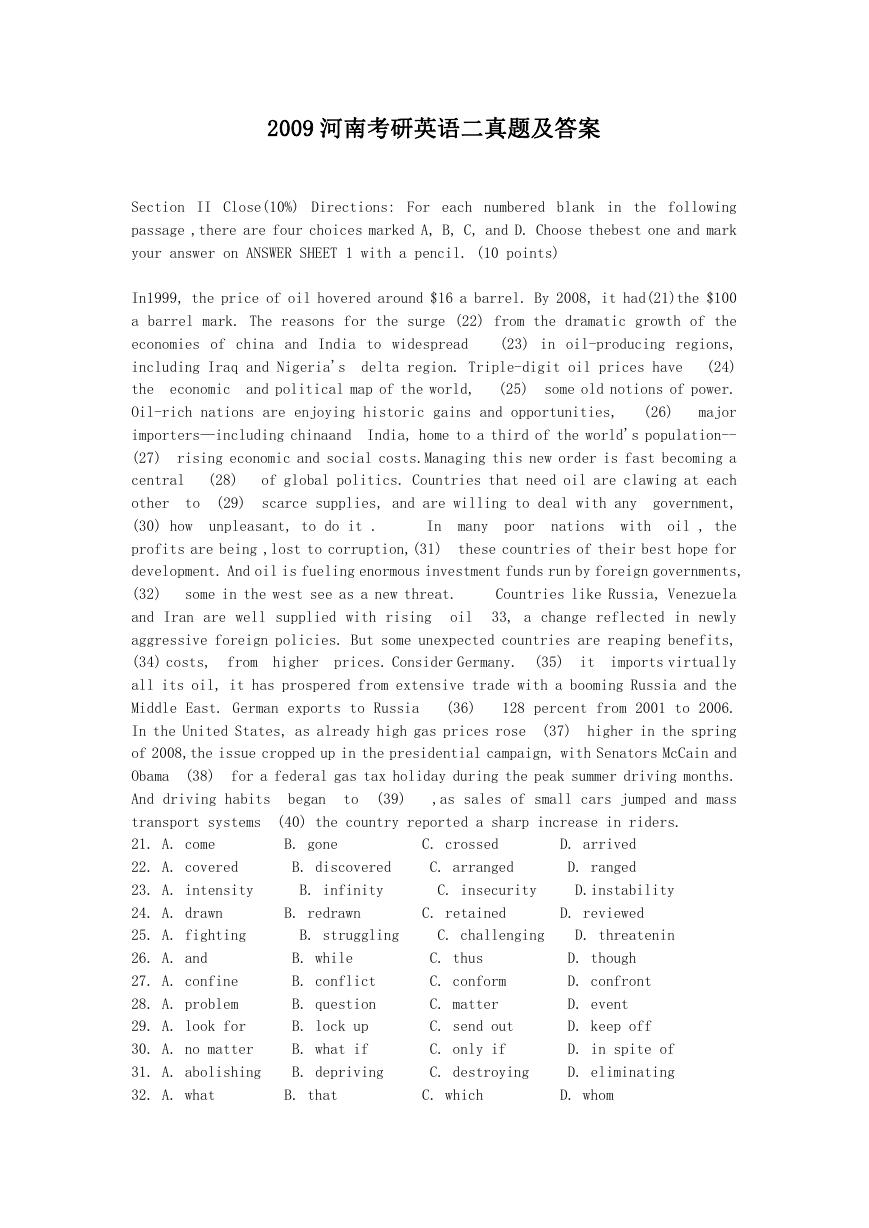
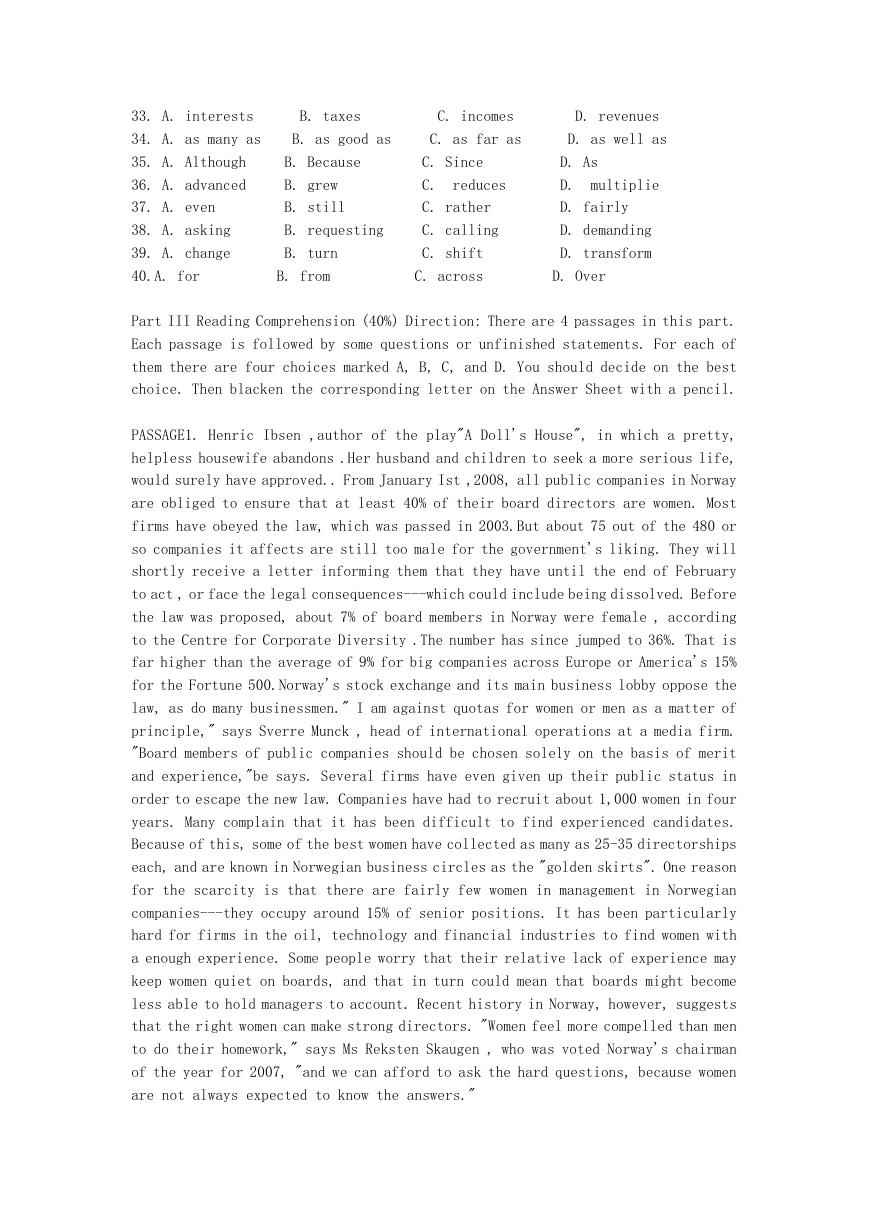
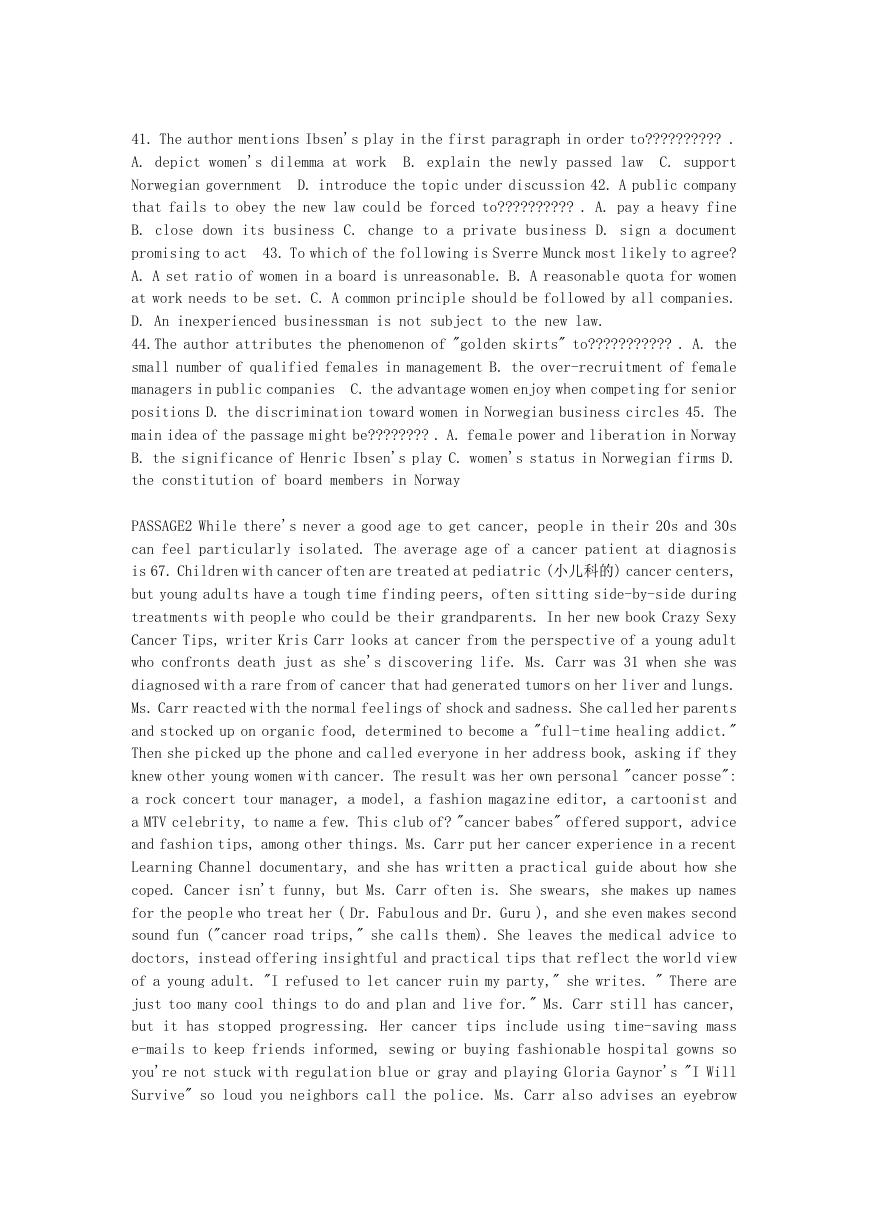
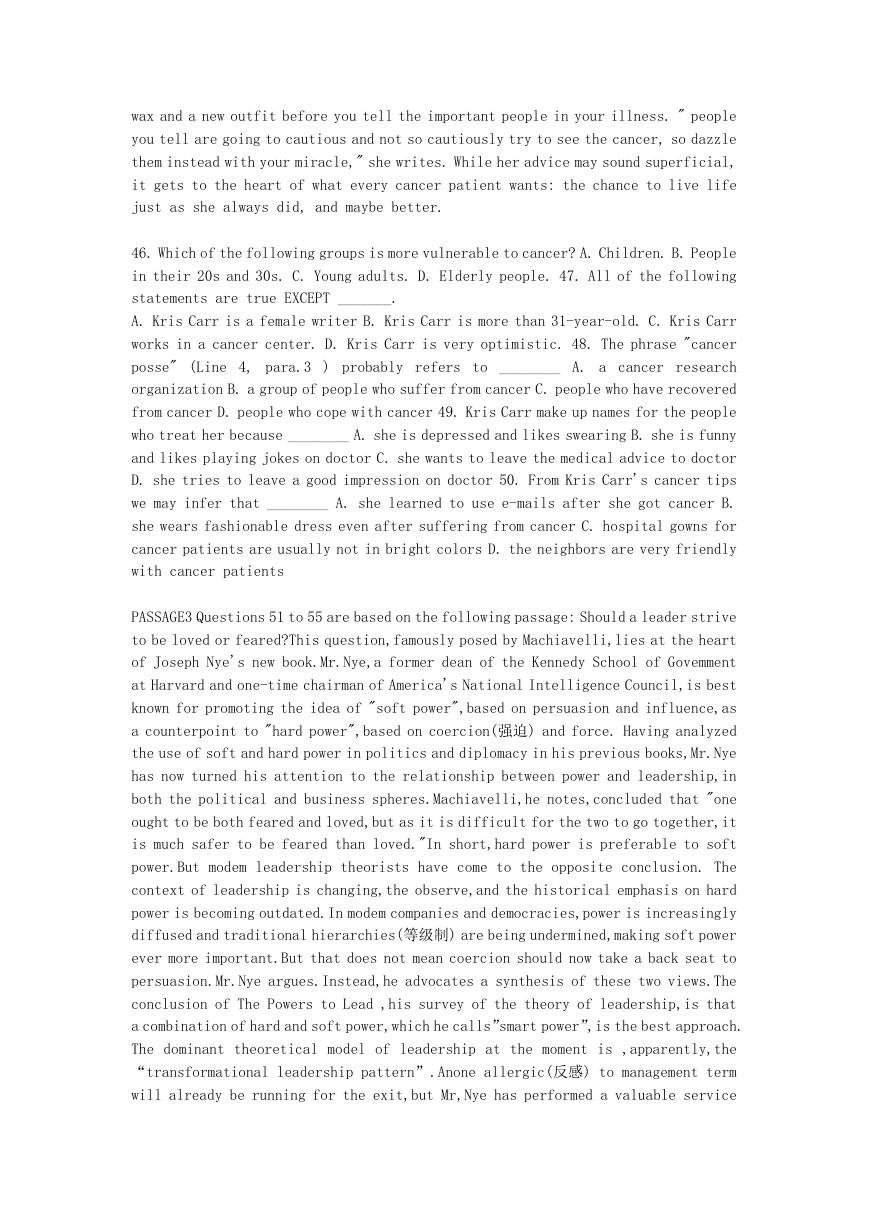
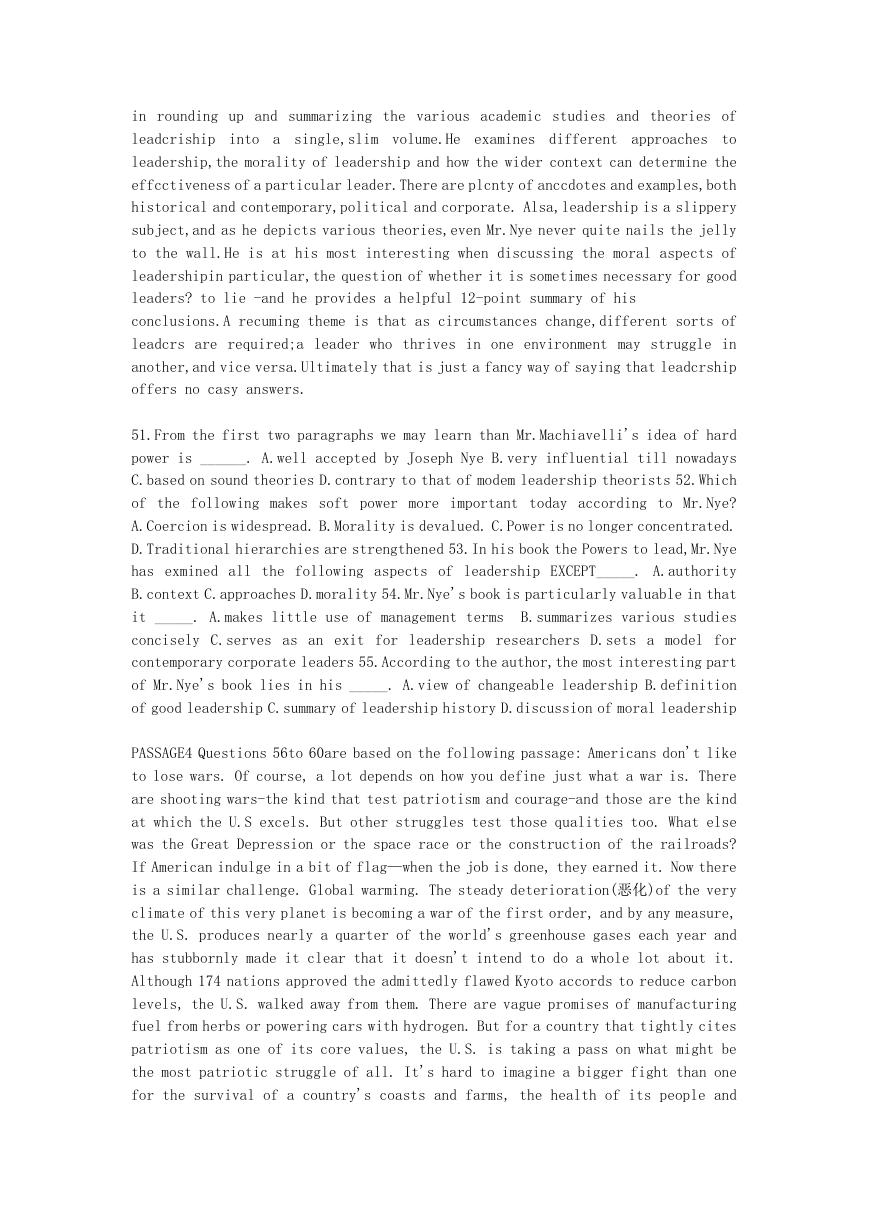
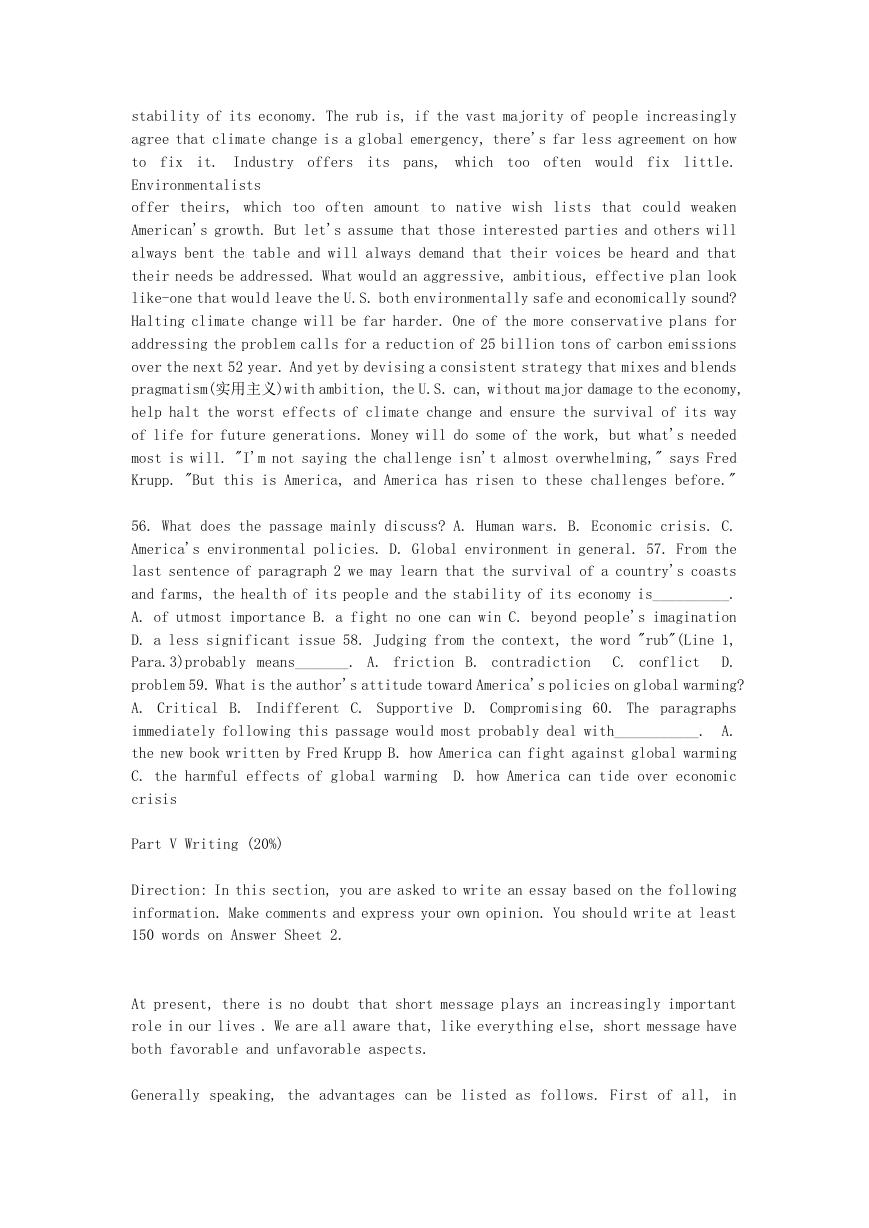
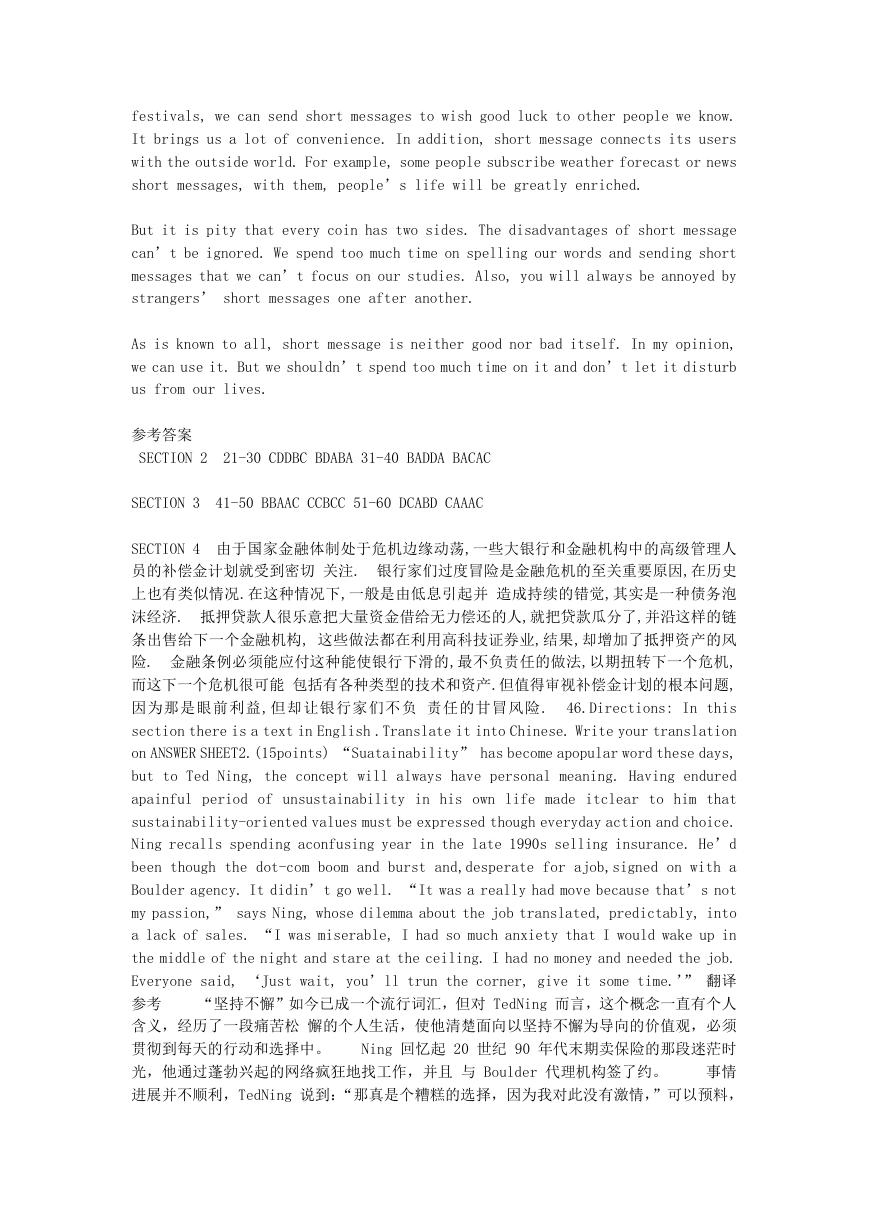
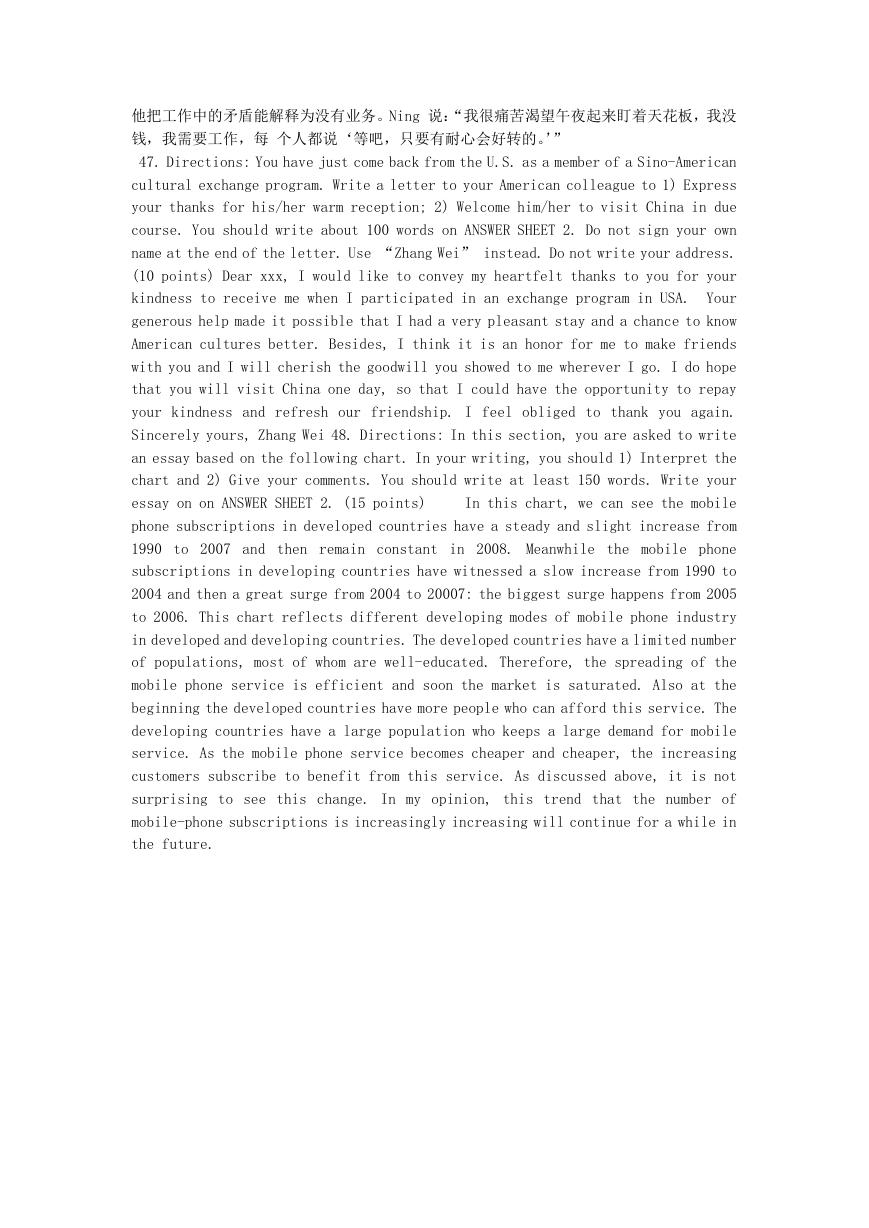








 2023年江西萍乡中考道德与法治真题及答案.doc
2023年江西萍乡中考道德与法治真题及答案.doc 2012年重庆南川中考生物真题及答案.doc
2012年重庆南川中考生物真题及答案.doc 2013年江西师范大学地理学综合及文艺理论基础考研真题.doc
2013年江西师范大学地理学综合及文艺理论基础考研真题.doc 2020年四川甘孜小升初语文真题及答案I卷.doc
2020年四川甘孜小升初语文真题及答案I卷.doc 2020年注册岩土工程师专业基础考试真题及答案.doc
2020年注册岩土工程师专业基础考试真题及答案.doc 2023-2024学年福建省厦门市九年级上学期数学月考试题及答案.doc
2023-2024学年福建省厦门市九年级上学期数学月考试题及答案.doc 2021-2022学年辽宁省沈阳市大东区九年级上学期语文期末试题及答案.doc
2021-2022学年辽宁省沈阳市大东区九年级上学期语文期末试题及答案.doc 2022-2023学年北京东城区初三第一学期物理期末试卷及答案.doc
2022-2023学年北京东城区初三第一学期物理期末试卷及答案.doc 2018上半年江西教师资格初中地理学科知识与教学能力真题及答案.doc
2018上半年江西教师资格初中地理学科知识与教学能力真题及答案.doc 2012年河北国家公务员申论考试真题及答案-省级.doc
2012年河北国家公务员申论考试真题及答案-省级.doc 2020-2021学年江苏省扬州市江都区邵樊片九年级上学期数学第一次质量检测试题及答案.doc
2020-2021学年江苏省扬州市江都区邵樊片九年级上学期数学第一次质量检测试题及答案.doc 2022下半年黑龙江教师资格证中学综合素质真题及答案.doc
2022下半年黑龙江教师资格证中学综合素质真题及答案.doc